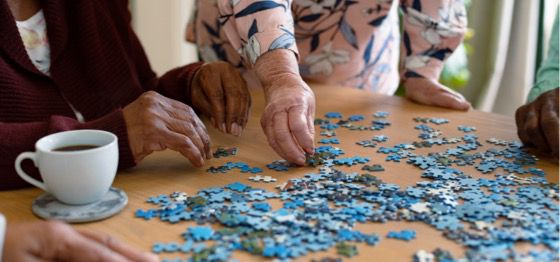Every country in the world is experiencing growth in both the size and proportion of older adults in the population. As people live longer, doctors and scientists become more aware of the factors that influence healthy aging as well as the top health concerns for seniors.1
What is aging?
According to the World Health Organization (WHO), biological aging results from the impact of the accumulation of a wide variety of molecular and cellular damage over time, which leads to a gradual decrease in physical and mental capacity and a growing risk of disease.2 These changes are only loosely associated with a person’s age in years, however, as most of the variations in older people’s health are due to variations in their physical and social environments, and in the choices and necessities that make up their lifestyles. Aging is often associated with major life transitions such as retirement, relocation, and the death of friends and partners.3
8 health issues to watch out for:
- Flu. Because peoples’ immune systems weaken with age, those who die or are hospitalized for flu-related complications are usually seniors.4 For older adults, an annual flu shot is an important preventive measure. Those over 65 should ask about high-dose flu vaccines, which offer even more protection against infection.5
- Weight gain. Aging bodies tend to lose muscle, which slows down metabolism. If seniors become less active, a gain in weight or obesity may be the result. Being overweight increases the risk of many conditions including heart disease, high blood pressure, diabetes and stroke, and exacerbates arthritis-related pain.6 Work with a doctor to come up with a diet and exercise plan to help maintain a healthy weight.
- Sleep problems. Older adults need 7-9 hours of sleep each night but may experience an age-shifted sleep-wake pattern that causes them to be tired earlier in the evening and to wake up earlier in the morning. Even those who were night owls in their younger days may experience this shift.7 Studies show that most sleep problems are not related to aging—they generally stem from medical or emotional conditions instead—but sleep problems significantly affect older adults who, after the age of 50, are more likely to develop memory problems, pain and depression, and even to experience nighttime falls when sleep is not adequate.8
- Nutrition concerns. Older bodies are more likely to be deficient in certain vitamins and nutrients. Seniors don’t absorb vitamin B12 as readily from food, for example, and so they may need supplementation. Calcium needs increase with age, vitamin B6’s role in keeping red blood cells healthy becomes more vital, and aging skin doesn’t soak up as much vitamin D from the sun.9 Multivitamins for seniors may offer adequate supplementation, but consult a doctor first, and especially in the case of potential interactions with prescription medication.10
- Fragile bones. Osteoporosis is a condition in which the bones become less dense and more prone to fracture. Almost everyone develops some degree of osteoporosis as they age. Some seniors have increasing difficulty with balance, making falls a significant risk factor in older adults, which are more likely to lead to broken bones.11 Vitamin D and calcium supplementation, and body-weight exercise, along with a healthy lifestyle, can help keep aging bones as strong as possible.12
- Cancer. Half of all cancers occur in people who are over the age of 65.13 Healthy lifestyle factors like maintaining a height-appropriate weight, eating well and exercising regularly can help lower cancer risks, but screening exams for certain cancers should become a part of a regular medical regimen. Men over 50 should be screened for colorectal, prostate and skin cancers. Women over 50 should be screened for breast, colon, cervical and skin cancers.14
- Depression. Many depressed seniors are not diagnosed, possibly because they or their doctors dismiss symptoms of depression as “natural” reactions to the changes that may come along with aging. Ongoing loss of pleasure in previously pleasurable activities should be discussed with a doctor. Lifestyle changes, as well as medication and therapy may be helpful.15
- Memory loss. In older adults the brain stores information differently, which can lead to difficulty in recalling recent events. Forgetting things like how to get home, or not being able to follow directions, however, could be a sign of a more serious underlying condition like dementia or Alzheimer’s disease.16 Talk with a doctor about any concerns regarding worsening issues with memory.
Additional health issues affecting older adults
Various systems in an older adult’s body may need extra attention as seniors age, including:
Digestive system. Age-related structural changes in the large intestine can increase the propensity for constipation in older adults. A healthy diet high in fiber, staying well hydrated and physical activity may help.17
Bladder and urinary tract. The aging bladder becomes less elastic and weakening bladder and pelvic floor muscles can result in incontinence. In men, an enlarged or inflamed prostate may also be a factor. Maintaining a healthy weight helps, as does avoiding bladder irritants like caffeine, acidic foods, alcohol and carbonated beverages.18
The aging process can’t be stopped, but with information about how aging affects the body and mind, seniors can make choices that improve their ability to maintain an active lifestyle and enjoy the company of friends and family.19
Go365 by Humana® makes wellness fun and easy. We help Humana Medicare members with Go365® on their plan reach health goals as well as take care of their physical and emotional health—allowing members to thrive at any age.
Humana Medicare members with Go365 on their plan can enroll in Go365 at
Go365 is a well-being and rewards program for many Humana Medicare Advantage members. To learn more about Humana Medicare Advantage, call to speak with a licensed Humana sales agent at 1-844-321-5843 (TTY:711), Monday – Friday, 8 a.m. – 8 p.m. local time or visit
If you need to enroll in Medicare Advantage or change your plan outside of the usual Medicare Annual Election Period, a Special Election Period (SEP) could be the answer. For information on eligibility, visit Humana’s
Sources:
1“Aging and health,” World Health Organization, last accessed September 27, 2022,
2“Aging and health.”
3“Aging and health.”
4Hope Cristol, “Surprising Health Challenges of Aging,” WebMD, last accessed September 27, 2022,
5Cristol, “Surprising Health Challenges of Aging.”
6Cristol, “Surprising Health Challenges of Aging.”
7Cristol, “Surprising Health Challenges of Aging.”
8Cristol, “Surprising Health Challenges of Aging.”
9Cristol, “Surprising Health Challenges of Aging.”
10Cristol, “Surprising Health Challenges of Aging.”
11Cristol, “Surprising Health Challenges of Aging.”
12Cristol, “Surprising Health Challenges of Aging.”
13Cristol, “Surprising Health Challenges of Aging.”
14Cristol, “Surprising Health Challenges of Aging.”
15Cristol, “Surprising Health Challenges of Aging.”
16Cristol, “Surprising Health Challenges of Aging.”
17“Aging: What to expect,” Mayo Clinic, last accessed September 27, 2022,
18“Aging: What to expect.”
19“Aging: What to expect.”
Go365 is not an insurance product and is not available with all Humana health plans. This is a general description of services which are subject to change. Product features may vary by client. Please refer to Customer Support for more information.
Humana is a Medicare Advantage HMO, PPO and PFFS organization and a stand-alone prescription drug plan with a Medicare contract. Humana is also a Coordinated Care plan with a Medicare contract and a contract with the state Medicaid program. Enrollment in any Humana plan depends on contract renewal.






